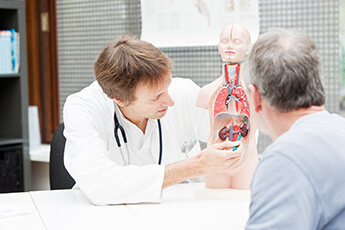Clinical trials for metastatic kidney cancer

Kidney cancer that hasn’t spread outside of a kidney responds well to treatments like surgery and radiation therapy. More than 9 out of 10 people with this type of localized kidney cancer (stage 1 and stage 2) are alive five or more years after the initial diagnosis.
But the prognosis isn’t as promising when kidney cancer spreads (metastasizes) to other parts of the body like the lymph nodes, bones, or brain. Called metastatic kidney cancer, this form of cancer is more difficult to treat. The 5-year survival rate for people with metastatic kidney cancer is 14%.
If you have an aggressive form of kidney cancer that’s likely to come back after treatment (recurrence) or spread, your doctor may recommend participating in a clinical trial to try new therapies still in development.
What is a clinical trial?
Medical experts conduct clinical trials to find new and better ways to detect and treat diseases like cancer. Clinical trials are research studies that have progressed beyond laboratory and animal studies to include people who voluntarily agree to try a new drug or treatment.
Is it safe to participate in a clinical trial?
All cancer treatments must successfully pass several clinical trial phases before the U.S. Food and Drug Administration (FDA) approves them for widespread public use. The FDA’s Center for Drug Evaluation and Research (CDER) oversees this task. If you’re taking a medicine for kidney cancer now, it means hundreds of people tried it out first in a clinical trial to make sure it was safe and effective.
Before researchers can enroll people in clinical trials, they conduct laboratory studies. If preliminary research indicates that a new treatment appears safe and beneficial, the FDA allows researchers to move to the next phase: a clinical trial. A separate independent body called an Institutional Review Board (IRB) monitors clinical studies to safeguard your health.
How do clinical trials help people with kidney cancer?
It can take 12 to 15 years for a drug to move through laboratory tests and all clinical trial phases before the FDA approves it. People with advanced metastatic cancers can’t wait that long. A clinical trial gives you early access to therapies that show promise in treating kidney cancer. The clinical trial may be testing a new drug or trying out a new combination of already-approved drugs.
In the best-case scenario, the new treatment puts the cancer into remission, which means you have no evidence of disease (NED, or no symptoms). You may live longer with few, if any, complications. This was the case for kidney cancer survivor Philip Prichard, whose kidney cancer spread to an adrenal gland that couldn’t be surgically removed. At the time, the only option left was long-term chemotherapy. Instead, Philip enrolled in a clinical trial to test a new immunotherapy drug.
Researchers hoped that the new immune checkpoint inhibitor, nivolumab, would engage the immune system to help it destroy cancer cells. After three years of treatment, Philip’s cancerous tumor was undetectable. In 2015, the FDA approved the drug (marketed as Opdivo®) for the treatment of metastatic kidney cancer. Philip remains in remission.
A later clinical study in 2018 showed that combining nivolumab with another immunotherapy drug, ipilimumab, is even more effective at adding years to a person’s life. Deaths among people enrolled in that clinical trial dropped by more than 30%, and 60% of the initial trial participants are still doing well. The trial was so successful that the FDA gave it a breakthrough therapy designation. This designation speeds up the drug approval process to get the treatment to the general public faster.
From the community: “I just recently started treatment in the new clinical trial using both nivolumab and ipilimumab. I've had 3 treatments, one treatment every three weeks. So far so good. I have had no reactions to the infusions at all. I was diagnosed in April of this year but I was feeling very tired and lethargic around the first of the year and had continued feeling that way up until 2-3 weeks ago. I'm now back to feeling like my old self. I'm energetic and my mental state is great. Just wondering if the trial drugs have anything to do with this? I had stage 4 clear cell renal cancer 6 years ago. They removed my right kidney and left adrenal gland. My first encounter with the oncologist was a little depressing. He said I had a 100% probability of my cancer coming back, and coming back quickly and he was not going to treat me until the cancer came back. It took 6 years for it to show itself again. My oncologist was amazed, obviously my immune has been fending of my cancer really well. My cancer has now re-appeared in 3 areas in my chest. My next scan is in 6 weeks, so I will not know how the drugs are working until then. I am hoping that my increase in energy and my new outlook on my life are an indication that maybe the immunotheropy is working? I came to this site with hopes that I might hear from others that are on this trial, just wondering how they are doing and what they are experiencing?” – Inspire member
What are the other benefits of clinical trials?
When you participate in a clinical trial, your doctor closely monitors you for any sign of problems. Clinical trials provide other benefits like:
more frequent health screenings with your doctor or clinical trial team, which may lead to improved overall health
helping researchers identify genetic links that increase the risk of certain cancers so they can develop treatments that target these gene changes (mutations)
potential for fewer treatment side effects, which can improve quality of life
advancing the field of medicine
helping future generations who develop the same disease
What are the downsides to being in a clinical trial?
Only about 3% of people with cancer sign up for clinical trials. This may explain why 4 out of 10 clinical trials don’t get enough participants to continue. When clinical trials can’t proceed, the world may miss out on potentially lifesaving treatments.
The reasons people give for not participating in clinical trials vary. Some people fear that they will receive a fake treatment (a placebo). But people with cancer receive a legitimate treatment when they enroll in clinical trials. You’ll never be at a point where you get no treatment at all. However, there is a chance that the new treatment won’t be as effective as the standard treatment. Researchers and doctors follow clinical trial findings closely. If an experimental drug doesn’t seem effective, the trial stops. You’ll quickly return to a more effective therapy.
Other potential downsides to participating in a clinical trial include:
side effects may be more severe
increased trips to the doctor for blood draws, screenings, and tests
not knowing which treatment you’re getting (for a blinded study)
getting the standard treatment instead of the experimental one (for a randomized clinical trial)
uncertain treatment outcomes
Another drawback may be cost. Some health insurers may not cover all of the costs for the extra screenings required by a clinical trial.
Are you a candidate for a clinical trial?
Clinical trial participation may also be low because not everyone who wishes to participate is eligible. Researchers must follow strict criteria when enrolling people in clinical trials. To determine eligibility, you’ll go through a screening process that includes a detailed review of your medical history.
Certain factors can affect eligibility like your:
age, gender, and overall health
cancer stage, symptoms, and type of kidney cancer, like renal cell carcinoma
current and previous medications and treatments
lab results
length of time since last treatment and treatment history
previous history of other cancers or health conditions
What new treatments are available for kidney cancer?
Clinical trial successes led to the approval of these combined therapies for metastatic kidney cancer in 2019:
axitinib (Inlyta®) and pembrolizumab (Keytruda®)
How do I find a clinical trial for metastatic kidney cancer?
Your healthcare team can discuss clinical trial options with you. These organizations can also help:
Sources
Being in a clinical trial. American Cancer Society. August 2020.
Deciding whether to be part of a clinical trial. American Cancer Society. August 2020.
Clinical trials: What you need to know. American Cancer Society. 2021.
Compassionate drug use. American Cancer Society. September 2020.
Kidney cancer: About clinical trials. American Society of Clinical Oncology. October 2020.
FDA drug approval process. Drugs.com. April 2020.
Clinical trials in cancer. Institute of Medicine Forum on Drug Discovery, Development, and Translation. 2010.
Clinical trials. Kidney Cancer Association.
Cancer stat facts: Kidney and renal pelvis cancer. National Cancer Institute.
New immunotherapy combination for kidney cancer. Roswell Park Comprehensive Cancer Center. March 2020.
Breakthrough therapy. U.S. Food and Drug Administration (FDA). January 2018.
Disclaimer
Member comments are lightly edited for length and to remove identifying information but are otherwise reproduced as they appear in the community as part of public posts.
This content is for general informational purposes only and does not necessarily reflect the views and opinions of any organization or individual. The content should not be used as a substitute for professional medical advice, diagnosis, or treatment. Please consult your healthcare provider about any questions you may have regarding a medical condition.



